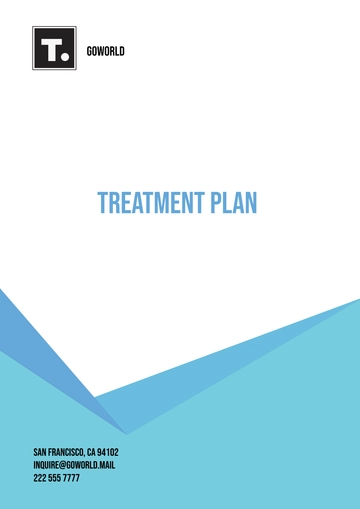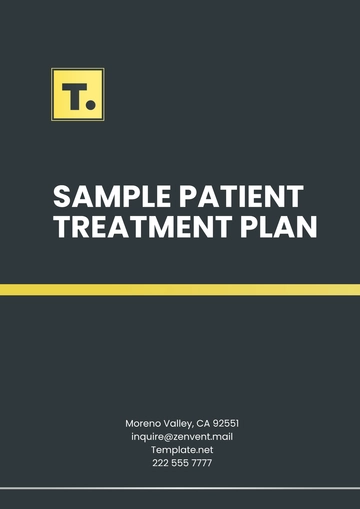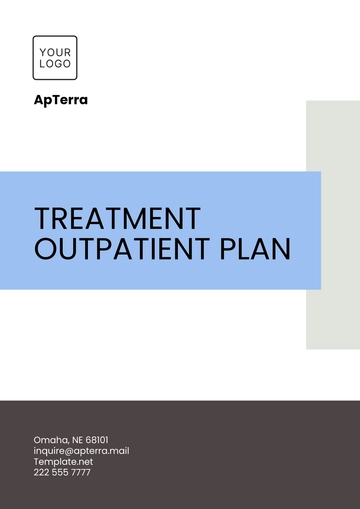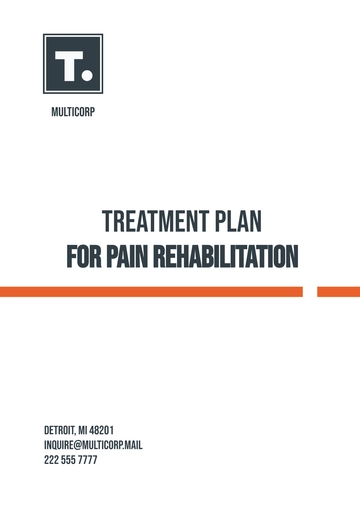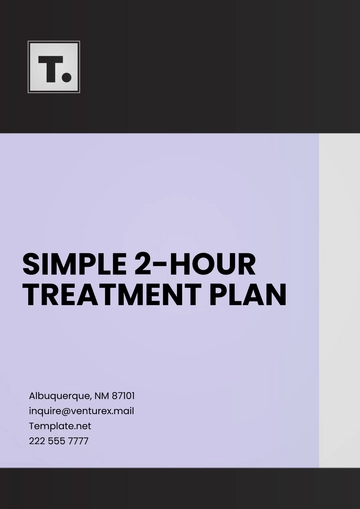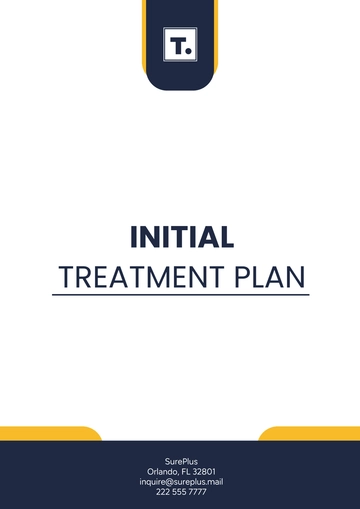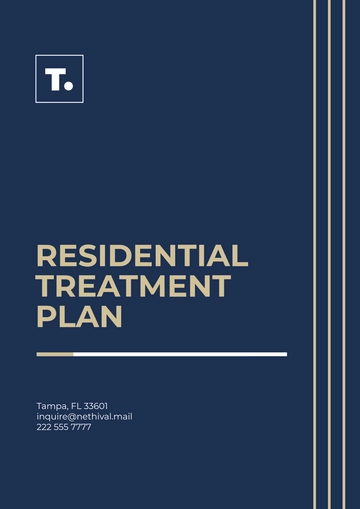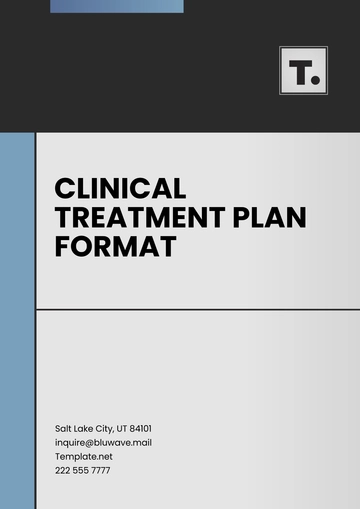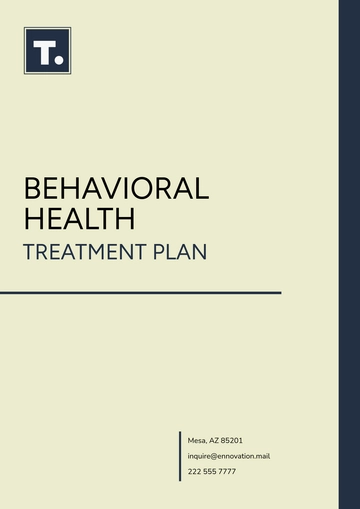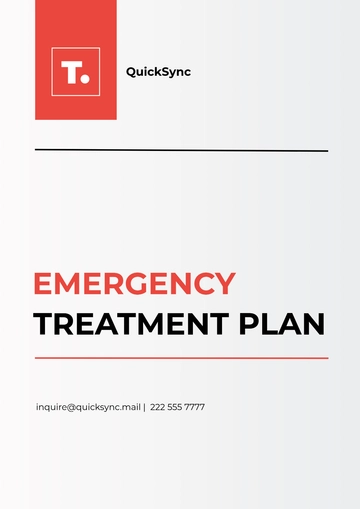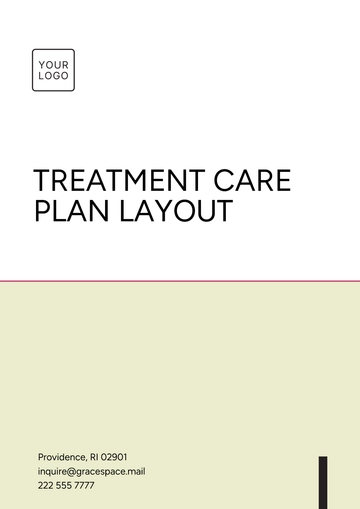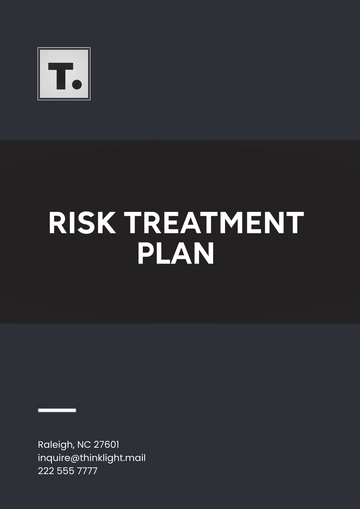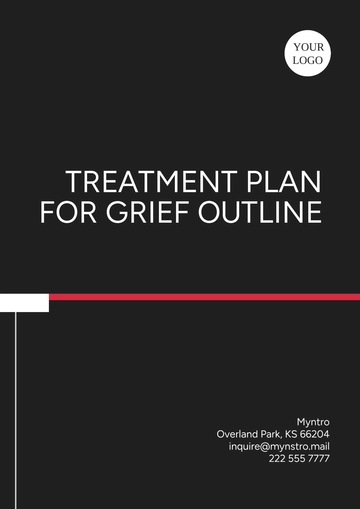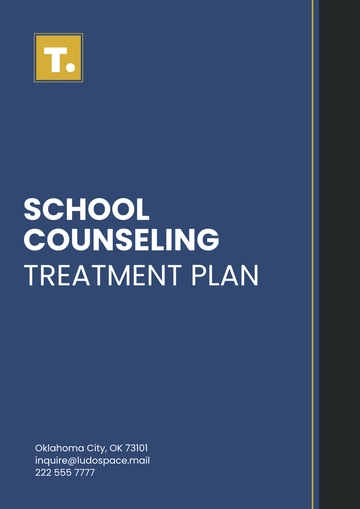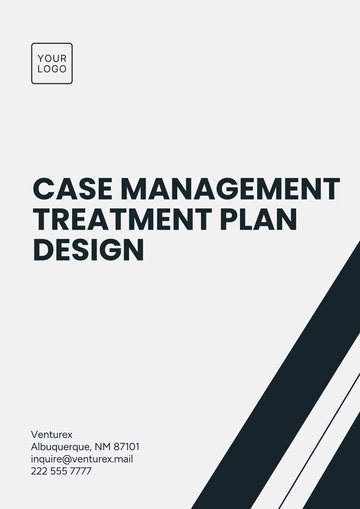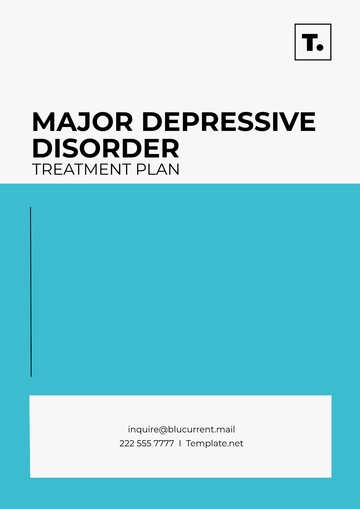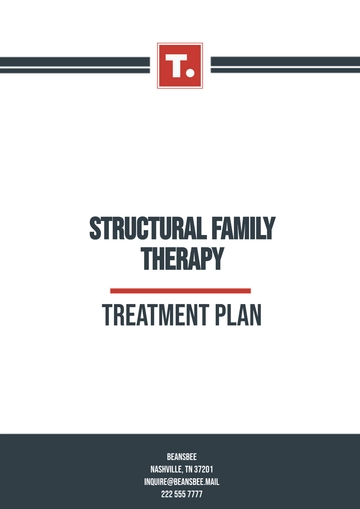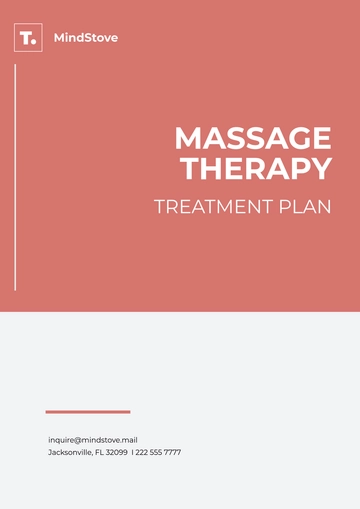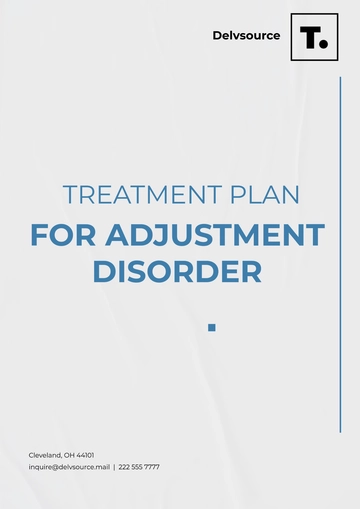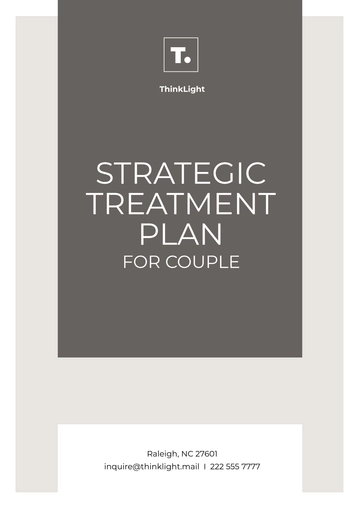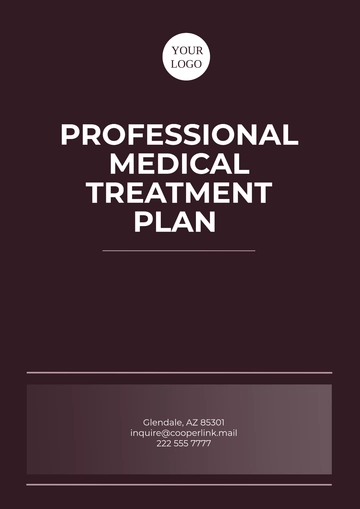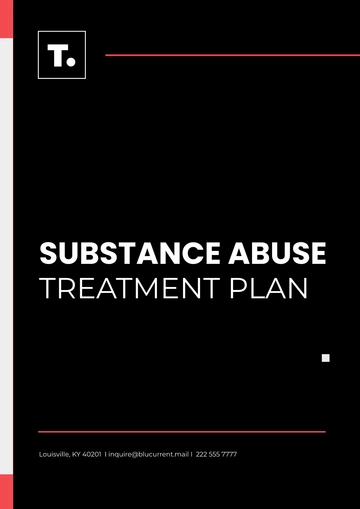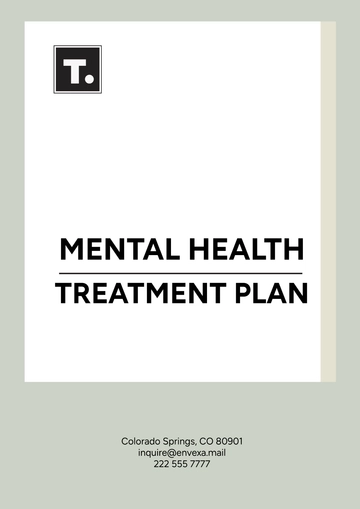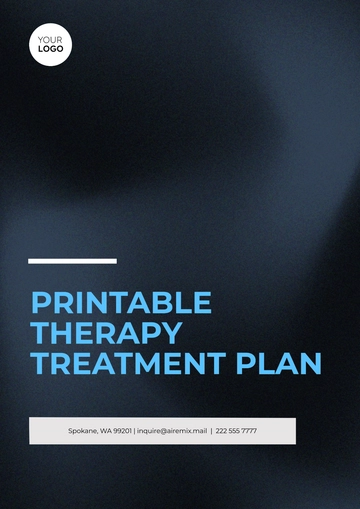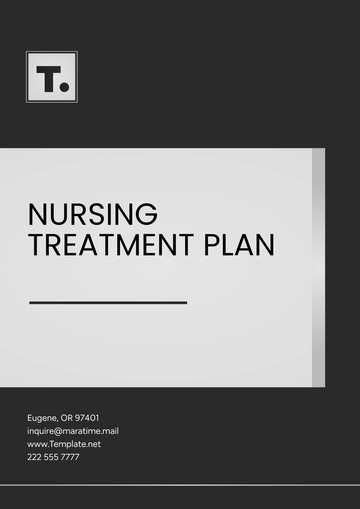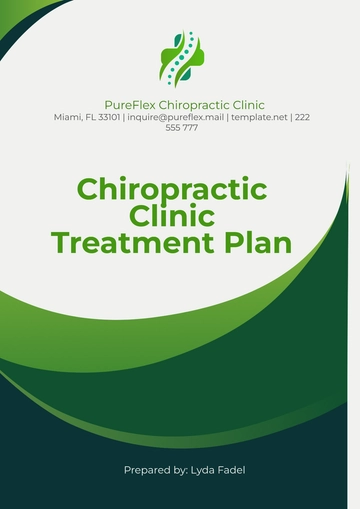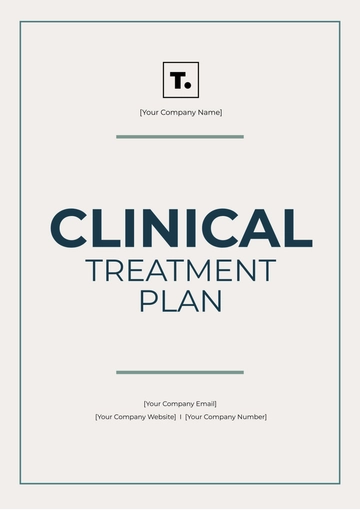Free Behavioral Health Treatment Plan
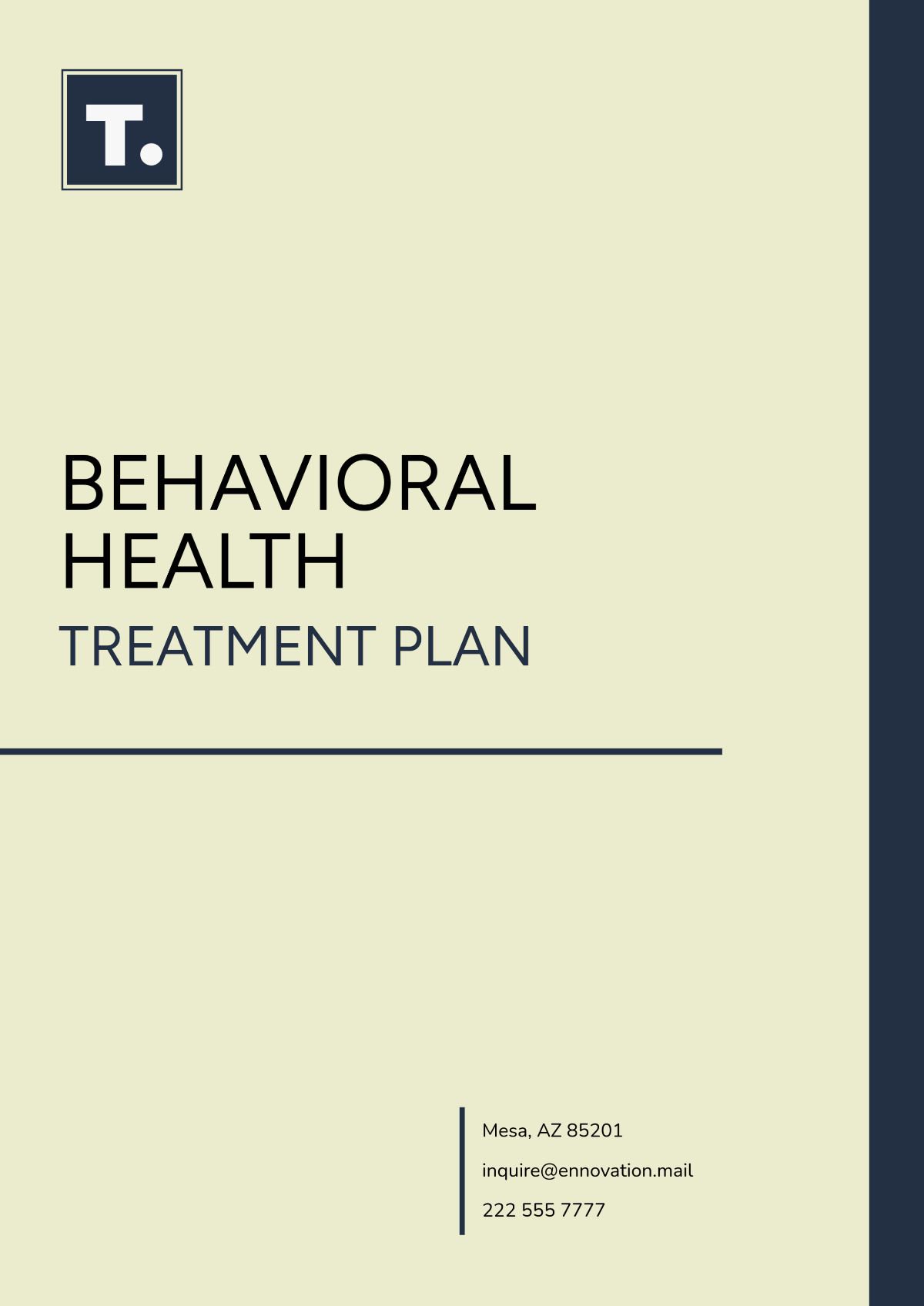
Prepared by: [Your Name]
I. Client Information
Name: [Patient's Name]
Age: [Patient's Age]
Gender: [Patient's Gender]
Contact Information: [Patient's Phone Number / Email]
Diagnosis: Generalized Anxiety Disorder (Severe)
II. Presenting Problems
The patient presents with severe anxiety symptoms, including excessive worry, restlessness, irritability, muscle tension, and difficulty concentrating. These symptoms significantly impair the client's daily functioning, leading to avoidance of social situations, work-related stress, and disruptions in interpersonal relationships.
III. Treatment Goals
Long-term Goal: Reduce symptoms of anxiety and improve overall functioning and quality of life.
Short-term Objectives:
Reduce the frequency and intensity of panic attacks.
Improve coping skills to manage anxiety triggers.
Increase social engagement and participation in group therapy sessions.
IV. Interventions
Intervention | Description |
|---|---|
Cognitive-Behavioral Therapy (CBT) | Participate in weekly group therapy sessions focused on CBT principles, including cognitive restructuring, relaxation techniques, and exposure therapy. |
Mindfulness and Relaxation Techniques | Learn and practice mindfulness exercises, deep breathing techniques, and progressive muscle relaxation to reduce physiological arousal and promote relaxation. |
Psychoeducation | Attend psychoeducational workshops or seminars on anxiety management, stress reduction, and assertiveness training to enhance understanding of anxiety symptoms and coping strategies. |
Social Skills Training | Engage in role-playing exercises and group discussions to improve social skills, assertiveness, and communication in various social situations. |
Medication Management (if applicable) | Collaborate with a psychiatrist to evaluate the need for medication to manage severe anxiety symptoms, such as selective serotonin reuptake inhibitors (SSRIs) or benzodiazepines. |
V. Timeline
Aspect | Details |
|---|---|
Duration of Treatment | The treatment plan is expected to span 12 weeks, with weekly group therapy sessions and ongoing support as needed. |
Progress Evaluation | Regular assessments of anxiety symptoms, coping skills, and functioning will be conducted throughout treatment to track progress and adjust interventions as necessary. |
VI. Progress Monitoring and Evaluation
Progress will be monitored through various methods, including self-report measures, observation, and therapist-administered assessments:
Weekly Anxiety Symptom Monitoring: Clients will complete self-report measures (e.g., Generalized Anxiety Disorder 7-item scale) to track changes in anxiety symptoms over time.
Behavioral Observation: Therapists will observe and assess clients' behavioral responses to anxiety-provoking situations during group therapy sessions.
Functional Assessment: Regular evaluations of clients' functioning in various domains (e.g., work, and social relationships) will be conducted to gauge improvements in daily functioning.
VII. Contingency Plans
In the event of severe anxiety symptoms or crises, clients will have access to:
Crisis Intervention Services: Immediate access to crisis hotlines, emergency mental health services, or crisis stabilization programs for urgent support and intervention.
Individual Therapy Sessions: Option to schedule additional individual therapy sessions for more intensive support and intervention as needed.
- 100% Customizable, free editor
- Access 1 Million+ Templates, photo’s & graphics
- Download or share as a template
- Click and replace photos, graphics, text, backgrounds
- Resize, crop, AI write & more
- Access advanced editor
Improve patient outcomes with the Behavioral Health Treatment Plan Template offered by Template.net. This customizable, downloadable tool provides a comprehensive framework for planning and tracking behavioral health interventions. Easily editable in our AI Editor Tool, it adapts to the unique needs of each client. Print your tailored treatment plans to deliver consistent, professional, and effective behavioral health care.
You may also like
- Finance Plan
- Construction Plan
- Sales Plan
- Development Plan
- Career Plan
- Budget Plan
- HR Plan
- Education Plan
- Transition Plan
- Work Plan
- Training Plan
- Communication Plan
- Operation Plan
- Health And Safety Plan
- Strategy Plan
- Professional Development Plan
- Advertising Plan
- Risk Management Plan
- Restaurant Plan
- School Plan
- Nursing Home Patient Care Plan
- Nursing Care Plan
- Plan Event
- Startup Plan
- Social Media Plan
- Staffing Plan
- Annual Plan
- Content Plan
- Payment Plan
- Implementation Plan
- Hotel Plan
- Workout Plan
- Accounting Plan
- Campaign Plan
- Essay Plan
- 30 60 90 Day Plan
- Research Plan
- Recruitment Plan
- 90 Day Plan
- Quarterly Plan
- Emergency Plan
- 5 Year Plan
- Gym Plan
- Personal Plan
- IT and Software Plan
- Treatment Plan
- Real Estate Plan
- Law Firm Plan
- Healthcare Plan
- Improvement Plan
- Media Plan
- 5 Year Business Plan
- Learning Plan
- Marketing Campaign Plan
- Travel Agency Plan
- Cleaning Services Plan
- Interior Design Plan
- Performance Plan
- PR Plan
- Birth Plan
- Life Plan
- SEO Plan
- Disaster Recovery Plan
- Continuity Plan
- Launch Plan
- Legal Plan
- Behavior Plan
- Performance Improvement Plan
- Salon Plan
- Security Plan
- Security Management Plan
- Employee Development Plan
- Quality Plan
- Service Improvement Plan
- Growth Plan
- Incident Response Plan
- Basketball Plan
- Emergency Action Plan
- Product Launch Plan
- Spa Plan
- Employee Training Plan
- Data Analysis Plan
- Employee Action Plan
- Territory Plan
- Audit Plan
- Classroom Plan
- Activity Plan
- Parenting Plan
- Care Plan
- Project Execution Plan
- Exercise Plan
- Internship Plan
- Software Development Plan
- Continuous Improvement Plan
- Leave Plan
- 90 Day Sales Plan
- Advertising Agency Plan
- Employee Transition Plan
- Smart Action Plan
- Workplace Safety Plan
- Behavior Change Plan
- Contingency Plan
- Continuity of Operations Plan
- Health Plan
- Quality Control Plan
- Self Plan
- Sports Development Plan
- Change Management Plan
- Ecommerce Plan
- Personal Financial Plan
- Process Improvement Plan
- 30-60-90 Day Sales Plan
- Crisis Management Plan
- Engagement Plan
- Execution Plan
- Pandemic Plan
- Quality Assurance Plan
- Service Continuity Plan
- Agile Project Plan
- Fundraising Plan
- Job Transition Plan
- Asset Maintenance Plan
- Maintenance Plan
- Software Test Plan
- Staff Training and Development Plan
- 3 Year Plan
- Brand Activation Plan
- Release Plan
- Resource Plan
- Risk Mitigation Plan
- Teacher Plan
- 30 60 90 Day Plan for New Manager
- Food Safety Plan
- Food Truck Plan
- Hiring Plan
- Quality Management Plan
- Wellness Plan
- Behavior Intervention Plan
- Bonus Plan
- Investment Plan
- Maternity Leave Plan
- Pandemic Response Plan
- Succession Planning
- Coaching Plan
- Configuration Management Plan
- Remote Work Plan
- Self Care Plan
- Teaching Plan
- 100-Day Plan
- HACCP Plan
- Student Plan
- Sustainability Plan
- 30 60 90 Day Plan for Interview
- Access Plan
- Site Specific Safety Plan
